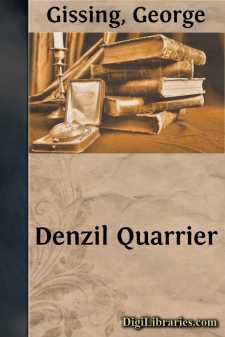Categories
- Antiques & Collectibles 13
- Architecture 36
- Art 48
- Bibles 22
- Biography & Autobiography 816
- Body, Mind & Spirit 145
- Business & Economics 28
- Children's Books 17
- Children's Fiction 14
- Computers 4
- Cooking 94
- Crafts & Hobbies 4
- Drama 346
- Education 58
- Family & Relationships 59
- Fiction 11834
- Foreign Language Study 3
- Games 19
- Gardening 17
- Health & Fitness 34
- History 1378
- House & Home 1
- Humor 147
- Juvenile Fiction 1873
- Juvenile Nonfiction 202
- Language Arts & Disciplines 89
- Law 16
- Literary Collections 686
- Literary Criticism 179
- Mathematics 13
- Medical 41
- Music 40
- Nature 179
- Non-Classifiable 1768
- Performing Arts 7
- Periodicals 1453
- Philosophy 66
- Photography 2
- Poetry 897
- Political Science 203
- Psychology 45
- Reference 154
- Religion 516
- Science 126
- Self-Help 85
- Social Science 82
- Sports & Recreation 34
- Study Aids 3
- Technology & Engineering 59
- Transportation 23
- Travel 463
- True Crime 29
George Gissing
George Gissing (1857-1903) was an English novelist known for his works depicting the harsh realities of lower-middle-class life in late Victorian society. His most notable novels include "New Grub Street" and "The Odd Women," which critically examine the struggles and moral dilemmas faced by writers and women, respectively. Gissing's detailed and often bleak portrayals of urban poverty and social issues have earned him recognition as a significant figure in English literature.
Author's Books:
Sort by:
by:
George Gissing
CHAPTER I Amid the throng of suburban arrivals volleyed forth from Waterloo Station on a May morning in the year '86, moved a slim, dark, absent-looking young man of one-and-twenty, whose name was Piers Otway. In regard to costume—blameless silk hat, and dark morning coat with lighter trousers—the City would not have disowned him, but he had not the City countenance. The rush for omnibus seats...
more...
by:
George Gissing
CHAPTER I Seven years long had the armies of Justinian warred against the Goths in Italy. Victor from Rhegium to Ravenna, the great commander Belisarius had returned to the East, Carrying captive a Gothic king. The cities of the conquered land were garrisoned by barbarians of many tongues, who bore the name of Roman soldiers; the Italian people, brought low by slaughter, dearth, and plague, crouched...
more...
by:
George Gissing
CHAPTER I. A MAN OF HIS DAY As the Milvains sat down to breakfast the clock of Wattleborough parish church struck eight; it was two miles away, but the strokes were borne very distinctly on the west wind this autumn morning. Jasper, listening before he cracked an egg, remarked with cheerfulness: 'There's a man being hanged in London at this moment.' 'Surely it isn't necessary...
more...
by:
George Gissing
THE WORK OF GEORGE GISSING AN INTRODUCTORY SURVEY 'Les gens tout ÐÑ fait heureux, forts et bien portants, sont-ils préparés comme il faut pour comprendre, pénétrer, exprimer la vie, notre vie si tourmentée et si courte?' MAUPASSANT. In England during the sixties and seventies of last century the world of books was dominated by one Gargantuan type of fiction. The terms book and...
more...
by:
George Gissing
CHAPTER I Moggie, the general, knocked at Mr. Gammon's door, and was answered by a sleepy "Hallo?" "Mrs. Bubb wants to know if you know what time it is, sir? 'Cos it's half-past eight an' more." "All right!" sounded cheerfully from within. "Any letters for me?" "Yes, sir; a 'eap." "Bring 'em up, and put 'em under the door....
more...
by:
George Gissing
CHAPTER 1 Harvey Rolfe was old enough to dine with deliberation, young and healthy enough to sauce with appetite the dishes he thoughtfully selected. You perceived in him the imperfect epicure. His club had no culinary fame; the dinner was merely tolerable; but Rolfe's unfinished palate flattered the second-rate cook. He knew nothing of vintages; it sufficed him to distinguish between Bordeaux and...
more...
by:
George Gissing
SCHOOL There was strange disorder in Miss Rutherford's schoolroom, wont to be the abode of decorum. True, it was the gathering-time after the dinner-hour, and Miss Rutherford herself was as yet out of sight; but things seemed to be going forward of a somewhat more serious kind than a game of romps among the children. There were screams and sobbings, hysterical cries for help; some of the little...
more...
by:
George Gissing
CHAPTER I The summer day in 1874 which closed the annual session of Whitelaw College was marked by a special ceremony, preceding the wonted distribution of academic rewards. At eleven in the morning (just as a heavy shower fell from the smoke-canopy above the roaring streets) the municipal authorities, educational dignitaries, and prominent burgesses of Kingsmill assembled on an open space before the...
more...
by:
George Gissing
CHAPTER I On the station platform at Dudley Port, in the dusk of a February afternoon, half-a-dozen people waited for the train to Birmingham. A south-west wind had loaded the air with moisture, which dripped at moments, thinly and sluggishly, from a featureless sky. The lamps, just lighted, cast upon wet wood and metal a pale yellow shimmer; voices sounded with peculiar clearness; so did the rumble of...
more...
by:
George Gissing
CHAPTER I For half an hour there had been perfect silence in the room. The cat upon the hearthrug slept profoundly; the fire was sunk to a still red glow; the cold light of the autumn afternoon thickened into dusk. Lilian seemed to be reading. She sat on a footstool, her arm resting on the seat of a basket-chair, which supported a large open volume. But her hand was never raised to turn a page, and it...
more...











